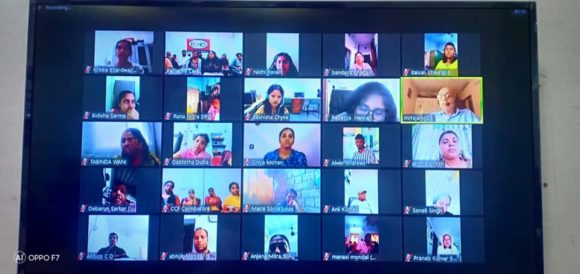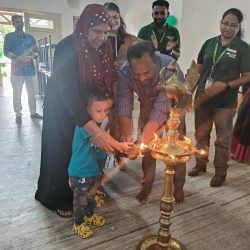Pallium India’s first online educational program for psychosocial clinicians concludes
Smriti Rana, Pallium India’s Programme Director, writes:
I already knew I wanted to pursue palliative care just under two decades ago, when I was still a psychologist in training.
But there was a major issue.
Hardly anyone knew what palliative care was, the non-medical side to it even less so.
I did my Masters thesis on the quality of life of caregivers, and gathered my data at a major cancer hospital, where they didn’t quite know where to fit me in, and were genuinely foxed that I was “wasting my time” on this subject. I was even told at the hospital to stick to something well-traversed and easier to understand, like depression or anxiety in cancer patients, and save both my guide as well as my evaluators the hassle of grappling with this strange subject I was hell bent on.
I had a fantastic bunch of professors though, who supported me whole-heartedly. And a brilliant, albeit eccentric, thesis guide who made people shake in their boots and was infamous for throwing painstakingly completed PhDs out his window if he didn’t think they were up to the mark. Under his guidance, I pulled off a decent enough thesis that I thankfully didn’t have to watch sailing through the air towards his neighbour’s yard.
It was a real struggle to find avenues through which I could train in being a mental health professional in palliative care. Both invisible fields. Both terribly underserved. I knocked about and picked up what I could, making it as far as the very prestigious St. Christophers Hospice for a few weeks, only to return and not know how to move forward in the field, till I eventually connected with Pallium India.
I am very lucky to have had great mentors all along, who patiently answered questions, spent hours debating and discussing psychosocial aspects of palliative care with me and taught me all I know through experiential learning on the field and by the bedside of patients.
Fast forward a decade. At Pallium India we concluded the first ever online training programme of psychosocial clinicians in palliative care, using the fabulous ECHO (Extension for Community Healthcare Outcomes) platform – the first of its kind in the region.
Our first series lasted 27 sessions, over 7 months, making it our lengthiest series yet. It was attended by approximately 30 people every week from across India, making it our most attended series yet.
It was a careful balance of didactic and case-based sessions, led by faculty I am privileged to call my colleagues, and attended by a group of participants that give me hope for palliative care in India being done right.
We covered a wide array of topics, from fundamentals of palliative care to marginalised communities, mental health issues, communication, end of life care and many more. Our last session today was on ‘Spiritual support in Palliative Care’ – a most apt and poetic conclusive session to this series.
We were overwhelmed by the very warm feedback we received, and I was particularly heartened to hear so many participants say that their confidence in their practice has increased by attending these sessions.
To me personally, this marks a major milestone. I am honoured to have been part of a process that now allows people like 21 year old me (and others of all ages) with limited access to training opportunities but a helluvalot of passion to participate in much needed skill building and learning.
My deepest thanks to ECHO India for giving us this phenomenal platform. ECHO has changed the way learning is evolving across the world. Also to my brilliant teammates in Pallium India – Rajalekshmi Balu for so efficiently and tirelessly coordinating the programme, following up with faculty and participants and ensuring this flawlessly executed series amongst the many others she is also overseeing; our in-house tech magician Vishnu Mohan Sen who kept the engines and machinery and everything else running, through power outages and other mad disturbances and without whom we would have stumbled and bumbled badly; Vyshnavi V K, Ashla Rani and Deepak Thomas for facilitating sessions; and everyone else in Pallium India who supported this programme and put up with my own eccentricities while developing the curriculum. Special gratitude to all the faculty who imparted their incredible wisdom through beautifully crafted sessions.
But most of all, to all the participants who saw value in this programme and are making such a difference with their practice across India, by bringing psychosocial palliative care to the forefront.
We may have concluded a series, but we have created a new community.





